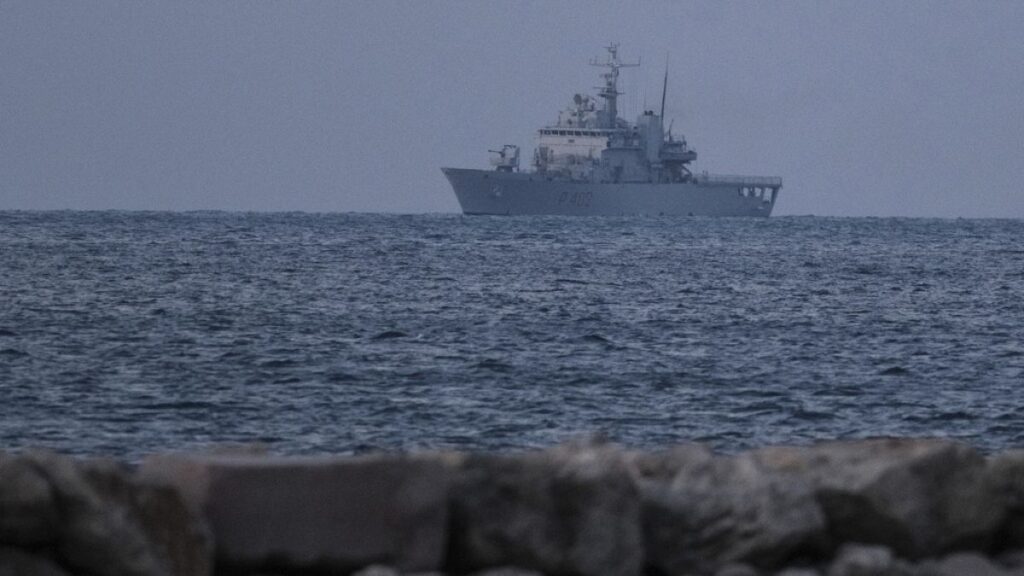After two days at sea, the Italian navy ship Libra docked at the port of Shengjin, where the 16 migrants from Bangladesh and Egypt will be disembarked and their asylum applications will be processed.
The National Navy ship Libra enters the Albanian port of Shengjin with the 16 first migrants which will be hosted in the Italian facilities built in the country.
A few dozen meters from the pier is the hotspot set up by Italy, where migrants will undergo health checks and identification procedures before being transferred – later in the day – to the camp. welcome in Gjadër, a few dozen kilometers from the port.
These are ten Bangladeshi migrants and six Egyptian migrants, all male and not in a vulnerable situation, who were rescued at sea after leaving Libya, said an Interior Ministry spokesperson.
These migrants were part of the thousand people who were heading towards the Sicilian island of Lampedusa or who had already disembarked there on Monday.
Last week, Italy officially opened two centers in Albania where it plans to processing thousands of asylum seekers outside its borders.
The centers will only accommodate adult men, while vulnerable people, such as women, children, the elderly, the sick or victims of torture, will be accommodated in Italy. Families will not be separated.
Italy’s ambassador to Albania, Fabrizio Bucci, said on Friday that the two centers were ready to welcome migrants, after their opening was delayed for months to consolidate the crumbling floor in one center, in Gjadër , where they will be housed.
Although the Gjadër center has a capacity to accommodate 3,000 migrants, it will start with 400 people and increase to 880 in a few weeks.
The number of people reaching Italy via the Central Mediterranean migration route from North Africa fell by 61% in 2024 compared to 2023. According to the Italian Interior Ministry, as of October 15, 54,129 migrants had arrived in Italy by sea this year, compared to 138,947 on the same date last year.
Under a five-year agreement signed last November by the Italian Prime Minister, Giorgia Meloni, and his Albanian counterpart, Edi Rama, up to 3,000 migrants collected each month by the Italian coast guard in international waters will be hosted in Albania. They will undergo an initial check on board the ships which rescue them before being sent to Albania for a more in-depth check.
The two centers will cost Italy 670 million euros ($730 million) over five years. The facilities are managed by Italy and fall under Italian jurisdiction, while Albanian guards provide external security.
The first center, located in Shengjin, 66 kilometers northwest of the capital, Tirana, is used for screening new arrivals. The other center, located about 22 kilometers to the east, near the former military airport of Gjadër, houses migrants while their asylum applications are processed.
Italian authorities expect that the center of Gjadër will never be fully occupied, but this depends on the flow of migrants brought to Albania.
In Albania, migrants retain their right under international and European Union law to seek asylum in Italy and have their application processed there, which is expected to take a maximum of 28 days, including including possible appeals.
Italy has agreed to welcome those who are granted asylum. Those whose applications are rejected risk being expelled directly from Albania.
The controversial agreement to entrust the accommodation of asylum seekers to a non-EU country has been welcomed by some countries which, like Italy, suffer a heavy refugee burden.
The agreement was approved by the President of the European Commission, Ursula von der Leyenwho called it an example of “out-of-the-box thinking” for solving the European Union’s immigration problem.
But human rights groups have denounced a dangerous precedent.
Mr. Rama made it clear thatno other country will be able to have such centers in Albania. He said Albania felt an expression of gratitude for the tens of thousands of Albanians who were welcomed by Italy during the fall of communism in 1991, or for the support provided by Rome during the economic crisis of 1997 and following the 2019 earthquake.
Ms. Meloni and her right-wing allies have long demanded that European countries share more of the immigration burden. She presented the agreement with Albania as an innovative solution to a problem that has vexed the EU for years.


